MORRISTOWN, Tenn. — Luis Bautista-Martinez was on his way home from church with his sister and her two children when the sound of a police siren brought back frightening memories of an officer pointing a gun at his head months earlier.
The 23-year-old had, at that point, been back in Tennessee for less than three days after his release from an immigration detention facility in rural Louisiana, where he was taken after being arrested in one of the biggest worksite immigration raids in the last 10 years. The siren wasn’t actually meant for him, but for a moment he was filled with anxiety, wondering if his brief freedom was about to end. He thought, are they coming back for me? Is it happening again?
Arriving at the mobile home where he lives with his sister, Esmeralda, her husband and their three young children, Bautista-Martinez went straight to his room and fell asleep. He told his sister he had a headache, a complaint he’d been making a lot since returning from the detention center, where the lights were kept on 24 hours a day.
“He’s happy to be home again, but the problems he experienced in the detention center are not easy to forget,” said Esmeralda, dismissing the notion that life could return to normal as soon as her younger brother was released.

Hardly anything about life in Morristown has been normal since the morning of April 5, when agents with the IRS, Immigration and Customs Enforcement, and the Tennessee Highway Patrol stormed the Southeastern Provisions meatpacking plant and slaughterhouse in nearby Bean Station where Bautista-Martinez had been working six 12-hour days a week for the past two years. A helicopter hovered as agents entered from all sides with guns drawn, some hurling insults but offering no explanation about what was happening as they ordered the employees to line up.
“I got scared because they were pointing their guns at us,” Bautista-Martinez recalled. “Since they had been attacking Latinos for a while, I thought, ‘Perhaps they are terrorists or something and they want to kill us all.’”
According to accounts of Bautista-Martinez and many others present during the raid, the agents did not appear to be looking for anyone specific, but rather seemed on a mission to round up as many Hispanic-looking workers as possible.
“There’s no individualized, specific list,” said Jeremy Jong, an attorney with the Southern Poverty Law Center’s Southeast Immigrant Freedom Initiative. Jong took on the cases of Bautista-Martinez and others detained after the raid. He said that, according to his clients, officers collected wallets and other personal items from the workers during the raid, which they later used to identify people only after they’d been zip-tied at the wrist and taken to the nearby National Guard Armory.

“They sat them down and they said, ‘What is your name and where are you from?’ then they wrote it down and made him sign some papers,” Jong said. Without arrest warrants or documented suspicion or probable cause against individual employees, the SPLC argues, the raid violated the Fourth Amendment rights of the plant’s Latino workers.
According to the Nashville-based Tennessee Immigrant and Refugee Rights Coalition, or TIRRC, which has been on the ground in Morristown since April helping coordinate legal services for families affected by the raid, at least one U.S. citizen, one DACA recipient and another person with legal work authorization were among those caught in the operation. All three were released once their identities had been verified.
Of the 97 remaining, 10 were arrested on federal criminal immigration charges for allegedly reentering the country illegally after a prior deportation, and one on pending state criminal charges. The rest, including Bautista-Martinez, who was born in Mexico, were placed under administrative arrest for civil immigration violations and entered into removal proceedings. With little explanation, ICE officials released 32 of those people within the first 24 hours and put the other 54 on vans bound for one of two immigration detention facilities in rural Louisiana.
Bautista-Martinez was part of the second group. During the 12-hour drive from Morristown, he says he saw the ICE agent behind the wheel raise his cellphone and snap a selfie with the van full of handcuffed men behind him.
After an overnight stop in Alabama, Bautista-Martinez arrived at the LaSalle ICE detention center, a privately owned facility with a history of reported abuses in the small town of Jena, La.

“The conditions are the same from the moment you get in until the moment you leave; they are horrible,” Bautista-Martinez said of the heavily guarded LaSalle facility, which sits behind a forbidding row of tall, nearly bare pines at the end of a rural two-lane road. The former juvenile detention center was used to house prisoners evacuated from New Orleans after Hurricane Katrina in 2005 before it was shut down amid accusations of inhumane treatment. GEO Group, one of the country’s biggest for-profit prison companies, reopened the facility in 2007 as an immigrant detention center, which it operates under contracts with ICE.
Over the years, the multibillion dollar GEO Group has been the subject of various lawsuits concerning the conditions and treatment of immigrant detainees at several of its facilities around the country, which are not subject to the same kind of oversight and standards of care as state or federal prisons. Recent lawsuits by current and former inmates at multiple GEO Group-operated ICE facilities allege that the company forces immigrant detainees to work within the detention centers for $1 a day under threat of punishment.
In emailed statements to Yahoo News, a spokesperson for the GEO Group addressed the recent inmate wage lawsuits by stating that, “As a service provider to the federal government, GEO is required to abide by [the] federally mandated standards” the government has laid out for “the Voluntary Work Program at all ICE Processing Centers, public and private” as well as the “congressionally established guidelines” for the wage rates associated with this program.
The spokesperson also said, “We strongly dispute these allegations” of inadequate care and poor treatment of immigrants detained at GEO operated facilities. “Members of our team strive to treat all of those entrusted to our care with compassion, dignity and respect.”
The 1,100-plus inmates at LaSalle are held on civil, not criminal charges. They are not sent there to serve out a sentence but to await hearings before an immigration judge. However, at least from the outside, the heavily secured compound surrounded by coils of razor wire appears indistinguishable from a prison. But unlike a prison, LaSalle includes an onsite immigration court. Since March of this year, a rotating roster of immigration judges have been deployed from various parts of the country to the small, windowless courtrooms to preside over detainees’ deportation proceedings.
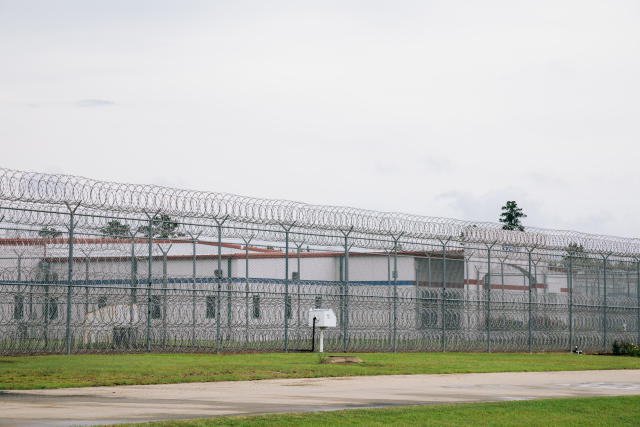
It was in one of those courtrooms that Yahoo News first spoke to Bautista-Martinez, about two months into his detention at LaSalle. He was escorted by a guard, who warned that photos of the large U.S. Department of Justice seal on the courtroom wall were prohibited, before retreating to the hallway outside the room, periodically peaking in through a small window in the door during the interview.
Clad in a navy prison uniform, his hair long and unruly, Bautista-Martinez described life in detention. He said he and the others from Tennessee were separated upon arrival, and he was assigned to a large room with nearly 100 beds. The lights in the room glared 24 hours a day, making it difficult to sleep or tell one day from the next. About an hour each day was spent outdoors.
The food ranged from bad to inedible. “On one occasion, I ate a piece of chocolate brownie cake that had metal fibers in it,” Bautista-Martinez said. He expressed concern about the facility’s failure to provide inmates with proper medical care, and he was particularly distraught by what he described as demeaning and racist language used by some of the guards.
“Many things happen in here that leave you stunned because you know they are not right,” he said. “We are people, we are not animals.”
“I think that not even a bad person, regardless of how bad they are, deserves to be treated the way they treat you in there.”

The hardest part about detention for Bautista-Martinez was being separated from his family. He choked up talking about his sister’s three children, about missing his nephew’s baptism and about his young niece crying on the phone when he called home.
Unlike in the criminal justice system, those in immigration court proceedings are not entitled to an attorney — a factor which, statistics show, significantly influences the chances of deportation. Immigration activists argue that LaSalle’s remote location, 200 miles from the nearest metropolitan area, makes it hard for detainees to get lawyers. A 2016 report by the Southern Poverty Law Center found that immigrants detained at LaSalle had among the country’s lowest rates of legal representation.
In the immediate aftermath of the raid, organizers with TIRRC collaborated with SPLC’s Southeast Immigrant Freedom Initiative and a few other Louisiana-based firms to assign lawyers to all those detained as a result of the operation, including Bautista-Martinez. Now they’re working to connect those released with attorneys in Tennessee.
Jong, who is based in Jena and will ultimately pass Bautista-Martinez’s case off to a lawyer in Tennessee, explained that he is hoping to pursue a motion to suppress any evidence against Bautista-Martinez that was obtained during the raid, arguing that ICE has no legal evidence of Bautista-Martinez’s immigration status and had no probable cause to arrest him.
Eighty-two days after the raid, an immigration judge released Bautista-Martinez from detention on a $6,500 bond.
The raid on Southeastern Provisions was the largest worksite immigration raid since nearly 400 were swept up by ICE agents at a kosher meatpacking plant in Postville, Iowa, in 2008.
Last October, the then-acting ICE director, Thomas Homan, who retired last month, revealed a new ICE initiative to crack down on undocumented workers as well as the businesses that employ them. While speaking at the conservative Heritage Foundation, Homan said that he’d ordered the agency’s Homeland Security Investigations division, or HSI, to increase the time spent on worksite enforcement operations “by four to five times” over the following year.

“Not only are we going to prosecute the employers that hire illegal workers, we’re going to detain and remove the illegal alien workers,” Homan said, pledging to do things “a little different” than the previous administration, which prioritized enforcing penalties for those who employ undocumented workers over arresting the workers themselves. “When we find you at a worksite, we’re no longer going to turn our heads.”
Heeding Homan’s call to action, ICE officers proceeded to investigate and arrest hundreds of immigrant workers in raids around the country, including an attention-grabbing sweep of 7-Eleven franchises in January that hit 98 of the convenience stores across 17 states, and resulted in 21 arrests.
The following month, ICE announced that officers had arrested 212 people on immigration charges and served notices of inspection to 122 businesses during a five-day operation across Los Angeles.
By May, ICE announced that Homeland Security Investigations had “already doubled the amount of ongoing worksite cases” over the previous fiscal year “less than seven months after” Homan called for an increase in such operations.
According to a press release issued by ICE on May 14, “from Oct. 1, 2017, through May 4, HSI opened 3,510 worksite investigations; initiated 2,282 I-9 audits; and made 594 criminal and 610 administrative worksite-related arrests, respectively. In comparison, for fiscal year 2017 – running October 2016 to September 2017 – HSI opened 1,716 worksite investigations; initiated 1,360 I-9 audits; and made 139 criminal arrests and 172 administrative arrests related to worksite enforcement.”
While there hasn’t been much research on the long-term effects of worksite immigration raids nationally, studies on the impacts of previous efforts to ramp up immigration enforcement in general — which, like raids, have largely netted immigrants with minor offenses who work and contribute to the economy — have found that removing such people from a community does not result in improved wages or employment opportunities for native-born workers.
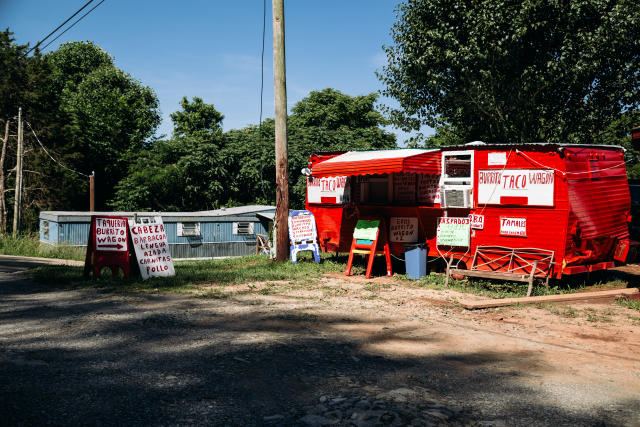
“Enforcement we’ve seen in the past has not created the jobs that [politicians] say should be created if you take these jobs away from undocumented immigrants,” said Giovanni Peri, an economics professor at the University of California, Davis, who studies the economic impacts of immigration. Peri said economic evidence does not show “a depressing effect of immigration on employment or a positive effect when immigrants move out. In fact, the opposite.”
Like other kinds of enforcement crackdowns, Peri said, large-scale raids on businesses that employ undocumented immigrants hardly benefit American workers, few of whom are willing to do the kinds of low-wage, menial jobs typically filled by immigrants. Instead, he predicted that the loss of immigrant labor may actually drive some businesses to move their operations offshore, taking with them other, more highly paid jobs that may have been held by native-born employees, and hurting local businesses.
“When you go and mess around with the local economy, you take away local jobs as well,” Peri said. “If these raids become a larger phenomenon, [there] could be bigger disruption” for the broader national economy.
In explaining his plan to crack down on undocumented workers, Homan made clear that the objective was to eliminate employment opportunities for undocumented workers, describing them as a “magnet,” pulling people to the U.S.
Realistically though, given the ubiquity of immigrants, both documented and not, across several sectors of the U.S. economy, such as construction, agriculture and food services, Peri said it will be almost impossible to crack down on undocumented labor in a meaningful way “without creating massive economic issues for these business[es]” in the industries that employ them. And despite tough talk from Homan and others like Attorney General Jeff Sessions, it remains to be seen if this administration is as serious about holding businesses accountable for unlawful behavior as it is about going after their employees.
More than three months after 97 people including Bautista-Martinez, and their families, had their lives upended by the raid, their employers have yet to suffer any legal penalties for hiring them.
The raid on Southeastern Provisions stemmed from a criminal investigation of the business’s owners, James and Pamela Brantley, into allegations of fraud, tax evasion and the unlawful of employment of undocumented immigrants.
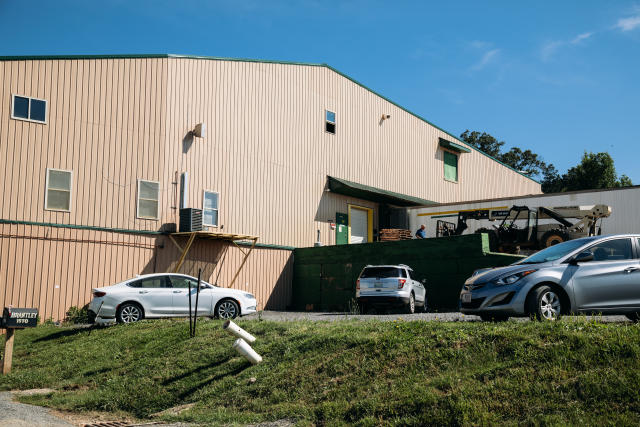
A search-warrant affidavit filed in federal court by the IRS alleged that the Brantleys had paid undocumented workers in cash since 2008, evading at least $2.5 million in payroll taxes and hiding millions more in wages from the IRS. The document says an undercover informant who briefly obtained a job at the plant observed that employees were exposed to bleach and other harsh chemicals without the appropriate protective eyewear and were required to work long hours without overtime pay. According to the affidavit, the informant “believes that Southeastern Provisions exploited these employees because they were illegal aliens and have no legal recourse for workplace mistreatment.”
Though the affidavit explicitly names James and Pamela Brantley, their daughter Kelsey and another employee, they were not arrested in the raid and have not been charged with a crime.
A spokesperson for ICE declined to comment, citing an ongoing criminal investigation, as did the public information officer for U.S. attorney’s office in the Eastern District of Tennessee. Both referred Yahoo News to court records filed under a specific case number. The records available in that case consist of the affidavit, the application for a warrant to search the business and the warrant itself. The case was closed on April 6, the day after the raid.
Exactly two months later, Yahoo News paid a visit to Southeastern Provisions.
Across the glimmering Cherokee Reservoir from Morristown, Grainger County’s third largest employer needs no sign to stand out amid the pastoral hills of Bean Station. The slaughterhouse and meatpacking plant are on both sides of a two-lane road, with a fairly large, unmarked building made of uneven corrugated tin walls that stop short of the ground on one side, and trailers and dilapidated-looking machinery on the other.
From the street, a group of workers could be seen walking out of the main building for what appeared to be a very short break among the cars and trucks that filled the parking lot. No more than 10 minutes later, they were back inside.
A woman who identified herself as James Brantley’s wife confirmed that “we’re up and running,” before insisting that Yahoo News leave the property.
Earlier that same week, Corso’s Flower and Garden Center in Sandusky, Ohio, reopened for business mere hours after immigration agents arrested 114 of its employees. The owners in that case were also not immediately charged.
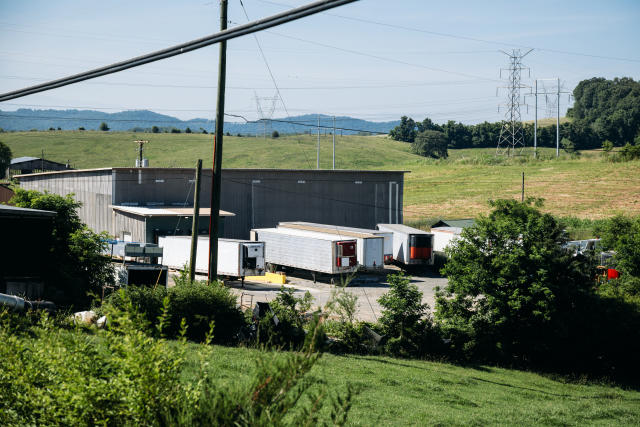
“In spite of the rhetoric that we have heard from the Trump administration about protecting American jobs, I think they’ve shown in multiple ways that they don’t have any real intention of protecting and advancing the needs of workers,” said Jessie Hahn, a labor and employment attorney with the National Immigration Law Center. Beyond being part of the administration’s broader “attack on immigrant communities,” Hahn said that raids “contribute to a climate of fear” in which workers — not just undocumented immigrants, but citizens and legal residents as well — are afraid to report labor violations. This intimidation, she said, “creates a dynamic where business owners can bring in another batch of employees and [it’s] business as usual.”
In addition to the apparent lack of consequences for employers following recent major raids, Hahn pointed to the fact that the first commutation of a prison sentence Trump granted as president was to Shalom Rubashkin, the ex-chief executive of the kosher meatpacking plant in Postville, Iowa, where nearly 400 undocumented workers, including children, were swept up in a massive immigration raid in 2008. A federal judge ultimately dismissed dozens of immigration charges against Rubashkin after he was convicted on several counts of fraud and sentenced to 27 years in prison.
To Hahn, the Trump administration’s clear message is “we’ve got the backs of employers.”
John Amaya, former ICE deputy chief of staff and senior adviser during the Obama administration, agreed that the signal sent by the Rubashkin commutation is unmistakable. “Trump blames illegal immigration on immigrant workers and does not find fault with unscrupulous employers,” he said.
However, while he could not speak to the specifics of the Tennessee raid or any current ICE operations, Amaya did note that, at least under the Obama administration, it was not uncommon during an ongoing criminal investigation for ICE to first arrest a number of workers with the intention of offering them some sort of legal benefit in exchange for testifying against their employer later on.
“It’s conceivable to believe that undocumented workers were arrested, but if the target is really the employers and managers, they could very well then be used as witnesses and actually be afforded some kind of benefit while they are testifying against the actual criminal target,” he said. “It could very well be that ICE is giving … these employers more opportunity to do themselves in.”
What happens next, he said, “really depends on what the administration is after.”
“Are they really after ending the habitual bad actor employer’s practices of leveraging undocumented workers? Or are they really just trying to instill fear in a particular demographic, in a particular subset of society?” Amaya believes it’s too soon to tell.
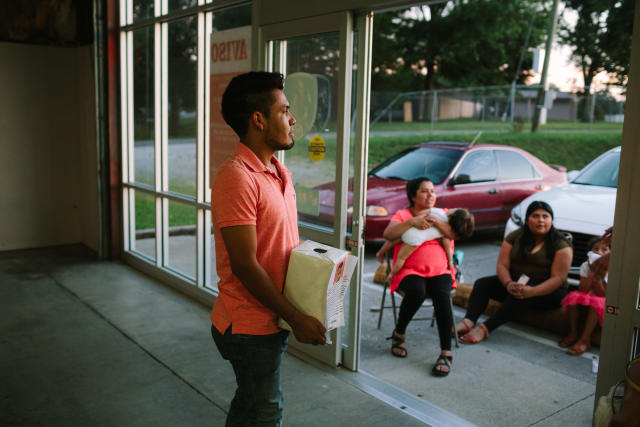
Bautista-Martinez has no idea who is working at Southeastern Provisions now, but is troubled by the fact that his former employers have been able to carry on with their business while he and so many others have continued to suffer major consequences.
“How is it possible that after everything that happened they are still working?” he asked, adding that the officers who conducted the raid “went inside the company and saw that it wasn’t operating lawfully.”
But the outcome of the investigation won’t undo the damage to Bautista-Martinez and his former co-workers, their families and the rest of the Hispanic community in Morristown.
“Some people are still not leaving their house,” Bautista-Martinez said. “They cannot buy food for their children, they can’t take them to doctor’s appointments, and they don’t take them to school. Even now they see a policeman and they feel afraid.”
TIRRC estimates that at least 160 children, most of whom are U.S. citizens and largely under the age of 10, had a parent arrested in that operation. But the reported number of kids who missed school the following day was well over 500.
“I think people were terrified ICE was still around,” said TIRRC co-director Stephanie Teatro. “There were lots of rumors that ICE was going to conduct subsequent raids on other meatpacking plants, trailer parks.”
Just over 20 percent of Morristown’s 30,000 residents are Hispanic. But nearly three months later, evidence of the Latino community’s existence is largely limited to park signs in English and Spanish and the sparsely populated row of Hispanic-owned businesses along South Cumberland Street, like the Juquilita Bakery or the Monte Alban grocery store.

“When we go to a place, there are no longer Latinos,” Bautista-Martinez said, observing how things have changed in the three months since he’s been gone.
The aftermath of the Morristown raid is reminiscent of Postville and other towns where large-scale immigration enforcement operations had a domino effect on the local economy, with fear driving many immigrants away or underground, causing local businesses to close and property values to fall.
For Bautista-Martinez’s brother-in-law, Ali, the aftershock of the raid has kept regular customers away from his store, where he sells religious artifacts. “It’s falling apart,” Ali said of the shop, explaining that he now has to sell items from his store at the nearby flea market to make up for the lack of business.
In the weeks leading up to his release from detention, Bautista-Martinez said, he met many men who’d recently arrived at LaSalle after being separated from their children at the border.
“It was easy for me to put myself in their shoes,” Bautista-Martinez said. “They are going through the same thing I went through.”
However, while Bautista-Martinez knew how it felt to be separated from his family, he pointed out that at least he knew where his family was and how to get ahold of them. For these new arrivals, he observed, the situation was even harder.

“They don’t have any way to know what is going on with their families, with their children,” he said. “There were people who had children who were as young as 3 years old, 5 years old, 6 years old, different ages. They had one, two or three kids. It’s very wrong that this is happening.”
Now that he’s back home, Bautista-Martinez continues to think about these families and others he met in detention, and remains frustrated by the injustices he witnessed. While he waits for his own case to make its way through the severely backlogged immigration court system, Bautista-Martinez is thinking about ways he can help others in the same situation. He’s already teamed up with a few of his former co-workers to try to raise money for Gonzalo Chavez, another worker arrested in the raid, who remains detained in Louisiana, with his bond set at $20,000. Next, Bautista-Martinez wants to learn English.
“It would be nice if I could study,” he said. “That way, I can help those who need … to interpret a document or when they have to go through a process like the one I am going through right now.”

The American families of the people illegals rape and or kill have the same problems forgetting!
ReplyDelete